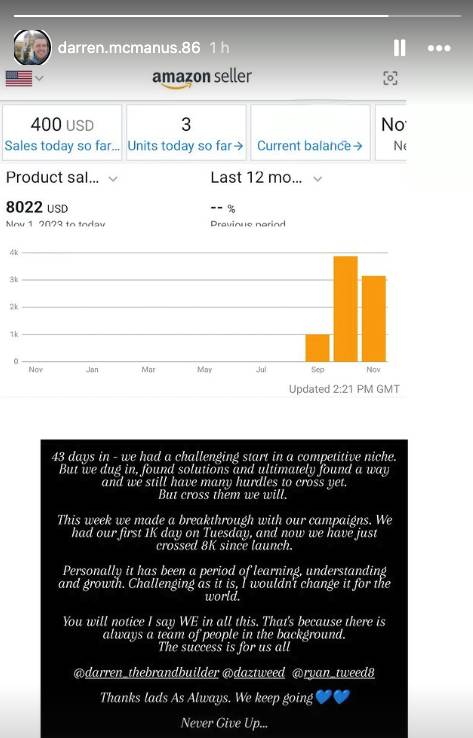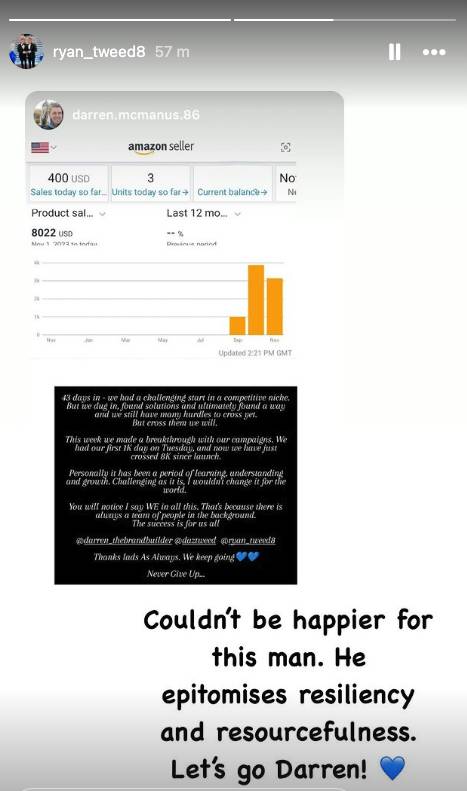In our commitment to transparency, we’ve continued to gather information from those involved in Darren Campbell’s FBA Brand Builder program. Recently, Darren M., an active participant in the program, reached out to share his positive experience. He emphasized the program’s support, mentorship, and community, painting a picture of life-changing benefits.
While we’re open to sharing balanced perspectives, it’s clear that our questions remain largely unanswered, leaving critical gaps about the program’s actual value.
This article explores these gaps and what we believe clients should know before committing thousands to this program.
Balancing Positive Experiences with Real Data
Darren M. describes the program as “transformative” and praises the community for offering support. However, he’s been unable to provide concrete evidence of success or a breakdown of program costs that would allow others to assess potential ROI realistically. Effective training programs typically present both the time commitment and financial investment upfront. So far, most of the positive testimonials from FBA Brand Builder focus on lifestyle shifts and motivational sentiments rather than the tangible data that reassures prospective students.
In our exchange with Darren M., we were provided with sweeping statements about “building a better life” and “finding a community,” sentiments echoed widely in FBA Brand Builder testimonials. However, when we asked for specifics around costs, ongoing support, and clear results, the responses were vague. To present an unbiased account, we need hard data rather than general praise. This is why we’ve taken a close look at what makes credible programs stand out and why FBA Brand Builder should provide similarly detailed information.


What Transparent Training Programs Provide: A Comparison with the Digital Marketing Institute
To illustrate the gap in transparency, it’s helpful to look at the Digital Marketing Institute (DMI), a well-known provider of digital marketing training. DMI clearly outlines its curriculum modules, course costs, required time commitments, and the professional backgrounds of its instructors, many of whom have extensive industry experience. Programs like these don’t rely on vague claims of success or lifestyle promises. Instead, they equip potential students with upfront details and certified educational credentials to make informed decisions.
Comparing DMI’s approach with FBA Brand Builder’s high-level, motivation-centric messaging reveals significant differences. FBA Brand Builder shares minimal information about course modules, costs, or qualifications of its instructors, limiting prospective students’ ability to evaluate what they’re paying for or where their money goes. The FBA Brand Builder website offers a lead generation form and a video from Campbell, leaving critical questions unanswered.
When potential clients are expected to invest £6,500 or more, they deserve detailed information. Programs like DMI and others in the educational sector commonly share sample lessons, lists of required tools, and a breakdown of costs at each stage. Without any of this, the FBA Brand Builder’s high fees and heavy emphasis on motivation over detailed instruction raise valid questions.

The Importance of Ethical Marketing and Transparent Information
Ethical marketing avoids exaggerating outcomes and glamorizing success stories while obscuring challenges and costs. For instance, many FBA Brand Builder success stories only highlight top-line revenue figures with no explanation of advertising costs, Amazon fees, or profit margins. Ethical marketing for educational programs typically includes breakdowns of potential earnings versus costs, especially for programs that require substantial financial investments.
While Darren M. and others claim that “success stories” are shared within the community, these follow a uniform template that emphasizes revenue screenshots and omits essential cost and profit details. Additionally, the non-disparagement clause within the FBA Brand Builder contract reportedly prevents clients from sharing anything negative, which prevents us from getting a balanced view of how this program works for those who don’t achieve success.
Moreover, some of the public “success stories” appear to come from members of Campbell’s own team, who, as we’ve previously reported, are often close associates. These success stories are also tightly controlled—another red flag for potential clients.

Public Response and Increased Reports to Authorities
The broader public response to FBA Brand Builder has been significant, with clients sharing their own experiences anonymously and even formally reporting concerns to Northern Irish authorities. Some clients have taken complaints to local officials due to cost transparency issues and unmet mentorship promises.
Recently, the Belfast Telegraph published a story based on reports and video evidence suggesting that Campbell may have encouraged clients to misrepresent their income on credit applications. It’s worth noting that these claims are backed by documented examples, and other news sources are investigating similar issues. We want to be clear: our coverage is focused on protecting consumers and ensuring accountability in business practices.
Seeking Accountability and Transparency in Success Stories
As journalists, we are committed to accuracy, and we remain open to hearing genuine success stories that provide hard facts. To accurately reflect the program’s effectiveness, we encourage testimonials that address:
- Comprehensive Cost Breakdown: A clear summary of all fees, including initial program fees, advertising spend, wholesale product costs, and Amazon fees, should be provided.
- Course Content and Benefits: Details on specific modules and training components that clients found valuable, along with concrete examples of how they benefited.
- Long-Term Profitability: Success stories should include data on net profit, accounting for costs, and offer insights into financial sustainability rather than one-time revenue snapshots.
- Transparency in Testimonials: We welcome testimonials from clients who are not currently under restrictive non-disclosure agreements and can speak openly about the entire experience.

TL;DR
We hope this article offers a balanced perspective. However, for a genuinely unbiased account, hard data and transparency from FBA Brand Builder and its participants are essential. Transformational claims are not enough to justify substantial fees—clients deserve transparency on the program's structure, expected investment, and real results. We will continue reporting on this story to ensure consumers have the full picture before investing in the FBA Brand Builder program.

